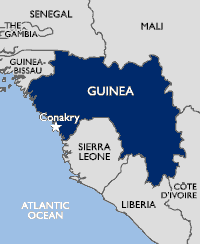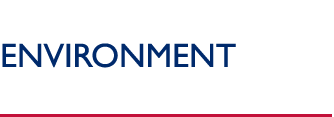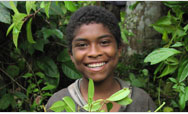Guinea
USAID supports improved governance in the sustainable management of Guinea’s tropical forests and watersheds. USAID’s climate change activities focus on a multi-sectoral, integrated approach to economic growth. Working to improve governance within the agriculture, natural resources management, and small enterprise development sectors, USAID’s work has led to more accountable and transparent government institutions, improved government services, and had positive impacts on climate change.
Background

Guinea’s forests and watersheds have the potential to contribute to positive results associated with global climate change (GCC). Every major West African river begins in Guinea, giving the country the title of “The Water Tower of West Africa”. Guinea’s watersheds are critical to the stable flow of water to six other West African countries. In addition, Guinea maintains some of the most important tropical forests in West Africa including the Mt. Nimba World Heritage Site.
USAID supports the sustainable management of tropical forests and global climate change in Guinea using an integrated approach to economic growth (agriculture, natural resources management, small enterprise development). USAID/Guinea also makes use of ‘co-forest management’ contracts between the Government of Guinea and forest communities as a means to decentralize government authority and to improve government services.
The greatest obstacle to achieving positive climate results in Guinea is poor governance. With this in mind, USAID uses a multi-sectoral approach to improve governance in all of its activities. In the agriculture and natural resources management sectors, the primary objective has been to decentralize government authority for the management of classified forests to rural communities. As a result, the USAID/Guinea’s co-forest management program has assisted resource users living adjacent to four classified forests to enter into a legal contract with the National Directorate of Forests and Water (DNEF) to manage their forests sustainably. The underlying hypothesis of this co-forest management program is that expanding opportunities for resource users to increase household income and agricultural productivity will result in the maintenance of tropical forests.
Sector-Specific Climate Change Activities
Agricultural productivity has grown at an average annual rate of four percent over the past decade. Most of this growth has come from the expansion of cultivated areas under “shifting cultivation,” rather than through agricultural intensification. Eventually, the use of extensive shifting cultivation could lead to negative impacts associated with climate change.
In order to break the vicious circle of agricultural expansion, natural resource degradation and poverty, USAID uses an integrated approach to agriculture, natural resource management, and small enterprise development. USAID/Guinea is improving the capacity of local communities to make use of more intensive and sustainable agriculture and land management practices (e.g., agroforestry, in-line crop planting). In addition, this work is leading to more accountable and transparent government institutions that are improving the delivery of services and agricultural inputs (e.g., improved seeds, inorganic fertilizers, and water control technologies).
The U.S. Forest Service (USFS) and the World Agroforestry Center (ICRAF) have formed a strong partnership in Guinea to assist the National Directorate of Water and Forests (DNEF) and the forest communities to implement co-forest management plans associated contracts at two levels as described below, in collaboration with USAID.
- Conakry DNEF headquarters. The USFS is improving the capacity of the DNEF to reform policies and provide essential technical services to the co-forest management communities.
- Community forest-level. The World Agroforestry Centre (ICRAF) is providing the co-forest management communities with technical assistance to intensify their agricultural systems, generate income, and manage their forest resources sustainably.
USAID/Guinea is also taking steps to address climate change on a regional scale. The Mission has provided leadership for the development of a sustainable forest management program in the Mano River region (covering Guinea, Liberia, Ivory Coast, and Sierra Leone). The Mission is also paving the way for the development of a program that will stimulate economic growth, improve agricultural productivity, and maintain forest resources. The work is being conducted collaboratively with USAID/West Africa and USAID headquarters in Washington DC.
In 2008, USAID/Guinea sponsored a ‘Mano River Region Transboundry Forest Management Workshop’ in Monrovia, Liberia. Representatives from the four African governments developed a regional action plan. This multidisciplinary approach to forest management will improve governance and contribute to maintaining peace throughout this volatile region. USAID/Guinea also hosted the ‘Regional West Africa Workshop on Sustainable Natural Resources Management’ in Conakry, Guinea in 2007. The workshop provided information on agriculture and natural resources best practices that are being used in the region.
In the future, the Mission plans to develop a Global Development Alliance activity for forest conservation and community development in the Forest Region of Guinea. The activity would be a partnership between USAID and the Rio Tinto mining company. In addition, USAID/Guinea plans to develop a remote sensing monitoring system with the U.S. Geological Survey for the Mano River regional sustainable forest management program. The activity will track changes in vegetation integrity over time to enable USAID to determine the impact of its field interventions in the region.
Partners
USAID’s partners in climate change activities in Guinea include:
- Center for International Forestry Research (CIFOR)
- Guinea Ministry of Agriculture
- Opportunity Industrialization Center International (OICI)
- U.S. Forest Service (USFS)
- World Agroforestry Centre (ICRAF)
Because partners change as new activities arise, this list of partners is not comprehensive.
Back to Top ^
|


